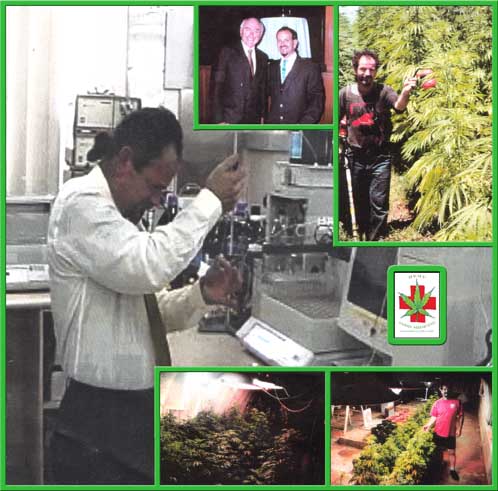| "Medical
Uses of Cannabis-Information for Medical Practitioners"
by
Andrew Kavasilas

NEW BOOK HIGHLIGHTS PROS AND CONS OF
MEDICAL USE OF CANNABIS
A new book which brings together
the relevant science regarding the beneficial effects of cannabis
for identified medical conditions and explains many harmful side
effects was launched at the Southern Cross University and the
Institute of Pain Management Research, Royal North Shore Hospital
in 2004.
Its author, HEMP Embassy President
Andrew Kavasilas, has stressed that the publication - "Medical
Uses of Cannabis-Information for Medical Practitioners"-
is a reference tool and not a manual for treatment.
This publication is a summary
of peer reviewed literature and international reviews concerning
the potential therapeutic uses and harmful effects of cannabis.
Currently, cannabis is being
used by patients suffering from diseases and illnesses including
HIV, multiple sclerosis and arthritis as well as those suffering
from chronic pain or undergoing chemotherapy. It is being used
to counteract the side effects of some drugs, as an appetite stimulant,
muscle relaxant and to promote a general sense of wellbeing.
"The information provided
is designed to help people make relevant and informed decisions
about their health care and should not be viewed as necessarily
advocating for the medical use of cannabis," Mr Kavasilas
said.
Instead it brings a substantial
amount of research together in a way that introduces medical practitioners
to the varied applications of studied cannabinotherapies.
"What I would say to
any patient is that if you intend using cannabis for medical purposes,
consult your regular doctor first and for patients who currently
use cannabis for medical purposes should ensure that their regular
doctor in informed.
Mr Kavasilas was asked by
the NSW Government to submit a preliminary report on a medical
cannabis users survey. The same questionaire is now being used
by the National Drug and Alcohol Research Centre for further analysis
of current medical cannabis users.
In an Australian first, Mr
Kavasilas also worked under permit to grow high THC cannabis and
study it at the SCU. Further cannabis samples were outsourced
to do a range of comparative analysis against street cannabis
used by recreational and medical users. His research has sought
to establish long-term procedures for the future analysis of high
THC cannabis.
Dr David Leach, Director of
Science at Southern Cross University's Centre for Phytochemistry
and Pharmacology- which has been involved in cannabis research
for several years- said the book contains an excellent and up
to date overview of cannabis research both locally and overseas.
"The local content covers
recent research on cannabis quality and use, balanced with current
regulatory issues and uses under consideration in New South Wales,:
he said.
"A comprehensive summary of documented indications and clinical
uses together with precautions, adverse effects, overdoses and
toxicity makes this an excellent reference text."
Get yourself a copy
for only $25, this weekend only, at the HEMP Embassy. Or email
an order through at www.medical-cannabis-information-service.com
An Academic Book Review
Medical Uses of
Cannabis - Information for Medical Practitioners.
By Andrew Kavasilas
Reviewed by Dr Len
Martin *
Medical Uses of Cannabis (MUC)
is a timely book, and an important one. Important because it provides
a simple inexpensive entry guide into the complex field of Marijuana
as Medicine - a guide based exclusively on top class reputable
medical and scientific sources.
I rate MUC as excellent, in that having read it, I now have a
good grasp of what is involved, and have even learnt some basic
science - the nature of the endogenous cannabinoid receptor system,
and how it interacts with the brain's pain pathways.
I also now understand that there is a very firm physiological
basis for using cannabis as a medicine and this is before checking
MUC's internet links.
In addition to numerous original research papers, MUC draws on
recent publications which indicate the quality of its sources:
Now remember, MUC does not pretend to be anything other than a
preliminary guide - it does not pretend to be a comprehensive
review of the literature. Having access to the internet certainly
gives excellent backup to MUC, but I emphasise that the book can
stand proud in its own right.
* Dr Len Martin BSc
PhD is an Honorary Research Consultant in the Department of Physiology
and Pharmacology at the School of Biomedical Sciences, University
of Queensland.

|